Justice at a Distance: Extending Freedom Globally
Select Format
Select Condition 
Book Overview
The current global-justice literature starts from the premise that world poverty is the result of structural injustice mostly attributable to past and present actions of governments and citizens of rich countries. As a result, that literature recommends vast coercive transfers of wealth from rich to poor societies, alongside stronger national and international governance. Justice at a Distance, in contrast, argues that global injustice is largely...
Format:Paperback
Language:English
ISBN:1107536022
ISBN13:9781107536029
Release Date:September 2015
Publisher:Cambridge University Press
Length:293 Pages
Weight:1.04 lbs.
Dimensions:0.7" x 6.0" x 9.1"
Customer Reviews
0 rating





